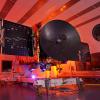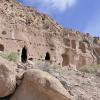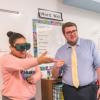Daniel Strain
 Researchers from the Laboratory for Atmospheric and Space Physics (LASP) worked side-by-side with teams from the United Arab Emirates to help them make this history-making mission a reality.
Researchers from the Laboratory for Atmospheric and Space Physics (LASP) worked side-by-side with teams from the United Arab Emirates to help them make this history-making mission a reality. Physicists at JILA achieve new feats of wafer-thinness in a study published this week.
Physicists at JILA achieve new feats of wafer-thinness in a study published this week. After 239 scientists signed on to a letter arguing that the coronavirus can go airborne, the World Health Organization updated its public health guidelines.
After 239 scientists signed on to a letter arguing that the coronavirus can go airborne, the World Health Organization updated its public health guidelines. Two new studies by researchers at CU Boulder may help to solve one of space’s biggest mysteries: why the solar system’s “detached objects” don’t circle the sun the way they should.
Two new studies by researchers at CU Boulder may help to solve one of space’s biggest mysteries: why the solar system’s “detached objects” don’t circle the sun the way they should. Researchers are exploring the tale of two online communities and their response to COVID-19: the r/Coronavirus and r/China_flu discussion boards on the social media site Reddit.
Researchers are exploring the tale of two online communities and their response to COVID-19: the r/Coronavirus and r/China_flu discussion boards on the social media site Reddit. Today’s modern cities, from Denver to Dubai, could learn a thing or two from the ancestral Pueblo communities that once stretched across the southwestern United States. For starters, the more people live together, the better the living standards.
Today’s modern cities, from Denver to Dubai, could learn a thing or two from the ancestral Pueblo communities that once stretched across the southwestern United States. For starters, the more people live together, the better the living standards. A new online master’s degree program seeks to support Colorado's teachers so that they'll stay in the classroom.
A new online master’s degree program seeks to support Colorado's teachers so that they'll stay in the classroom.
 David Bortz is a member of Colorado's COVID-19 Modeling Team, a group of researchers from across the state who have assembled to get in front of the coronavirus.
David Bortz is a member of Colorado's COVID-19 Modeling Team, a group of researchers from across the state who have assembled to get in front of the coronavirus. As the wilds around Joanna Lamberts research sites in Africa and North America have vanished, the conservation biologist has struggled to keep hopeful amid the losses.
As the wilds around Joanna Lamberts research sites in Africa and North America have vanished, the conservation biologist has struggled to keep hopeful amid the losses. Researchers have discovered an elusive phase of matter, first proposed more than 100 years ago and sought after ever since.
Researchers have discovered an elusive phase of matter, first proposed more than 100 years ago and sought after ever since.


